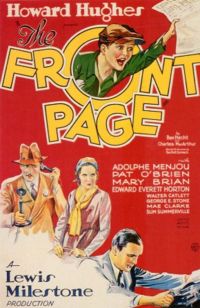
‘Lewis Milestone’s 1930 version, even if prints were generally available, would be found these days to move at somewhat too stately a pace for comfort; the dialogue is sedately spaced out in order to accommodate the primitive sound equipment, and Milestone fills in with tricky panning shots remembered from his own All Quiet on the Western Front.’
Adolph Menjou plays hard-boiled Chicago newspaper editor Walter Burns, who tries to prevent his best writer, Hildy Johnson, played by Pat O’Brien, from leaving the paper to get married.
Halliwell’s verdict looks forward to the Cary Grant/Rosalind Russell remake, His Girl Friday:
‘It gives a fair rendering of the play, and communicates the right sense of claustrophobia, but in the circumstances it isn’t surprising that a few years later, when movies were slicker, the idea of a remake occurred to Howard Hawks.’
Ex-Chicago newspapermen Ben Hecht and Charles MacArthur wrote the biting, fast-paced satirical play on which this film was based. Halliwell described it as –
‘The blackest of black comedies… boasted the least prepossessing cast of characters ever exposed to small-town America. For sheer callousness in the face of someone else’s imminent death, Edward G. Robinson as Little Caesar has nothing on the reporters and corrupt officials who assemble in the forlorn press room of Chicago’s jail on the night before the execution of mild little Earl Williams.’
Despite Hecht having already moved into film-writing, winning an Oscar for Underworld in 1927, Bartlett Cormack and Charles Lederer wrote the first screen version of the play. Halliwell further comments:

Halliwell |
| The Front Page |